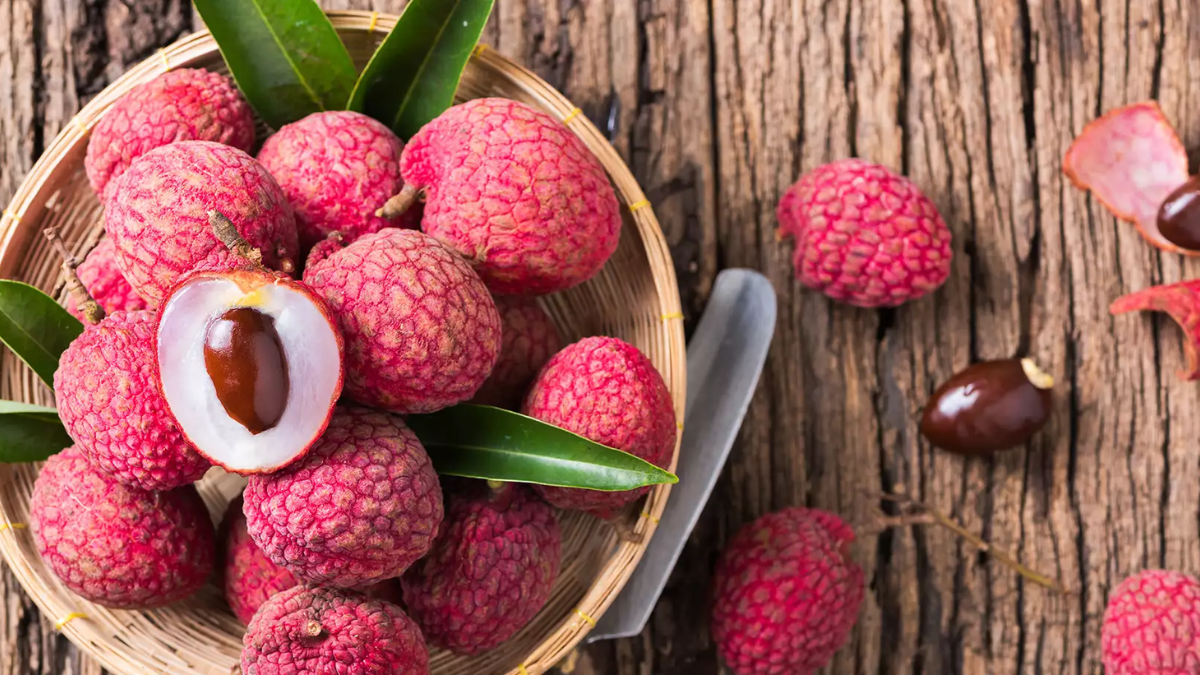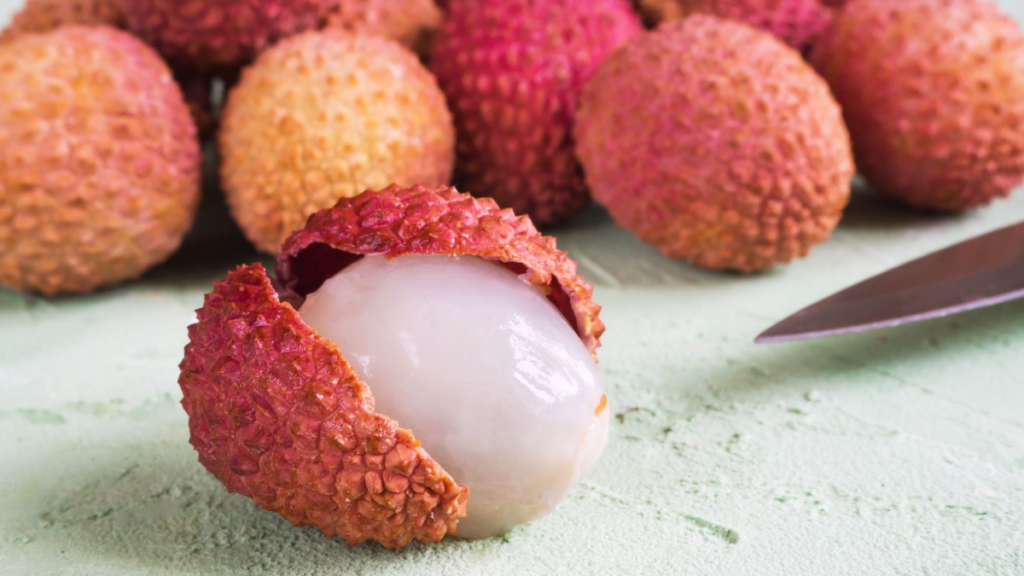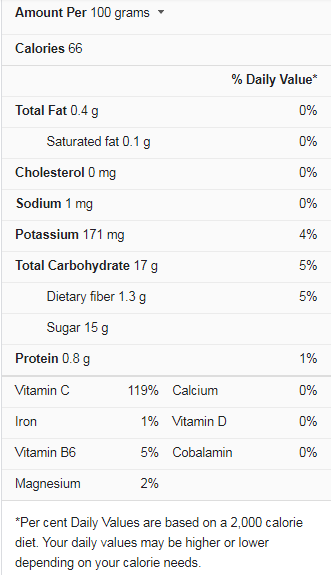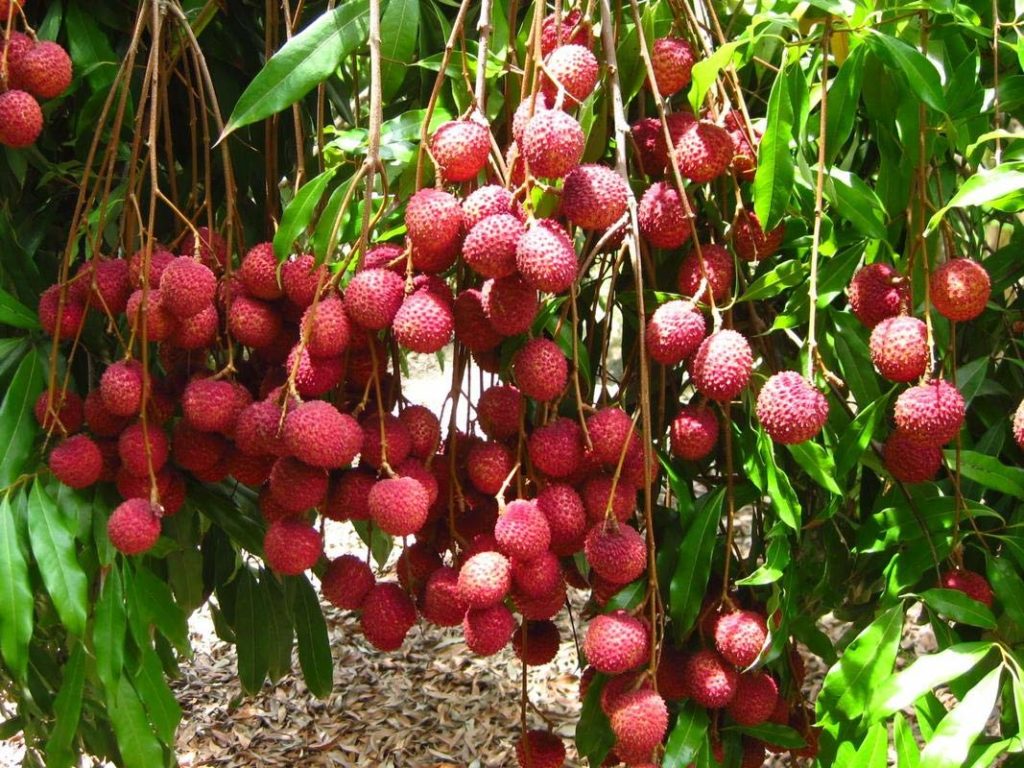The lychee fruit is a small spherical fruit with scaly red skin, sweet juicy pulp, and a single big seed. Litchi is another name for Lychee. It’s a popular Asian fruit used in various desserts and drinks, including jellies, cocktails, and ice creams. Lychee is a fruit that has been grown in China for thousands of years. It now thrives in India, Vietnam, Indonesia, Australia, and the United States, among other places. Lychee can be purchased fresh, dried, or tinned. Preserves, wine, and sauces are all prepared from Lychee.
Lychee Nutrition Facts
Lychee’s Health Benefits
Consumption of fruits daily It is suggested that you consume 1.5 to 2.5 cups of fruit and 2 to 4 cups of veggies every day. Eating more fruits and vegetables can help you avoid illnesses including cardiovascular disease, stroke, and certain types of cancer.
Trying different fruits and vegetables, such as Lychee, adds variety to your meals. Fruits can help you stay on a weight-loss plan if you eat them instead of dessert.
One of the most abundant vitamins in lychees is vitamin C. According to experts, the lychee fruit provides 9% of the Recommended Daily Intake (RDI).
According to a study published in the American Journal of Clinical Nutrition, vitamin C intake lowers the risk of stroke by 42%. Litchis have more polyphenols than many other fruits.
Epicatechin, which is plentiful in the fruit, may improve heart health and reduce cancer and diabetes risk. Lychees are also high in rutin.
According to a study published in the journal Food Chemistry, rutin may help protect the human body against chronic diseases such as cancer, diabetes, and other cardiovascular ailments.
Oligonol, a patented blend of litchi skin and green tea developed by Japan’s Amino Up Chemical Corporation, has been shown to reduce belly fat, fatigue, and inflammation after exercise, despite not being naturally contained in the fruit.
Litchis are high in vitamin E, which aids in the healing of sunburns that cause discomfort and inflammation and keep the skin healthy and glowing, according to scientists.
Vitamins. Vitamin C is abundant in lychee fruit, and adults should consume 75 milligrams to 90 milligrams of vitamin C each day. Lychee has 71.5 mg of vitamin C per 100 grams.
The state of your liver. Your liver serves a variety of tasks in your body, which involves converting nutrients into chemicals that your body can use and eliminating contaminants. Early research suggests that lychee fruit may aid in managing liver illness.
Anti-cancer properties. Lychee extract may have cancer-fighting effects, and it may be able to halt the progression of many malignancies’ cells. However, more research is required.
Low blood sugar levels. In some Indian areas, lychee fruit has been related to brain inflammation in youngsters. Hypoglycin A, a chemical found in lychees, is said to cause blood sugar levels to plummet, and Hypoglycemia (low blood sugar) is the effect of this.
However, starvation could have had a role in the study’s blood sugar problems. Many of these children skipped dinner in favor of lychees. The next morning, they were sick, with symptoms such as convulsions and a high fever.
Allergies. Lychee includes proteins that can cause allergic responses in some people. There have been few scientific investigations on lychee fruit allergies. Among the symptoms they mentioned were:
How Many Lychees Should I Consume Daily?
The key to success is moderation. If you eat properly and exercise regularly, 10-12 litchis per day should not affect your body. Weight loss: Litchis help with weight loss mostly because of the fiber and roughage they contain. Fresh Lychee counts toward the recommended two cups of fruit per day, and it’s high in vitamin C and contains fiber and other vitamins and minerals. Adults shouldn’t eat more than 200 fresh lychees at a time, or about ten cans worth, based on how much was in the fruit, how much he peed out, and the urine levels found in victims.
Seven lychees (one serve) have the same vitamin C as a tiny orange and offer 100% of the daily vitamin C requirement. Lychees are also second only to strawberries in terms of antioxidant content. They are fat-free and have fewer than 65 calories per 100g. Lychees have a GI of 57, which is considered medium. Litchi is high in dietary fiber and is beneficial for weight loss. It’s a great fruit for weight loss because it’s high in water and low in calories. Other critical minerals in the fruit include magnesium, phosphorus, iron, manganese, and copper, all of which are beneficial to bone health.
Are Lychees High in Sugar?
These sugary fruits might have a lot of sugar in them. According to the United States Department of Agriculture (USDA), one cup of fresh lychees contains about 29 grams of sugar. Lychee seed extract may aid with diabetes-related vascular difficulties, and the polyphenol oligonol in the lychee fruit may help with insulin resistance. The fruit may also aid in the reduction of inflammation and oxidative stress linked to diabetes and obesity.
They do, however, contain a significant amount of sugar (29 g per cup). People with high blood sugar levels should avoid all sugary foods with a high glycemic index. Sugary fruits, such as lychees, have a high GI and may contribute to an increase in blood glucose levels. Toxicity caused by naturally occurring toxins in the lychee fruit has been linked to fever, convulsions, and seizures.
Is Lychee Beneficial to Weight Loss?
Litchi is high in dietary fiber and is beneficial for weight loss. It’s a great fruit for weight loss because it’s high in water and low in calories. Other critical minerals in the fruit include magnesium, phosphorus, iron, manganese, and copper, all of which are beneficial to bone health. Lychees are a good source of nutritional fiber, antioxidants, and water, and they contain only a few calories and a trace amount of fat. Dietary fiber in lychees has been shown to aid weight loss in studies. Furthermore, consuming lychees may help to manage bowel movements and digestion.
Lychee may aid with weight loss. A 2009 study found that polyphenol-rich lychee extract reduces bodyweight, abdominal circumference, and visceral fat compared to a placebo. The fat surrounding your abdomen is known as visceral fat, and it raises your chances of developing heart disease and type 2 diabetes. If you follow a healthy diet and exercise routine, eating litchis every day should not hurt your body. Weight loss: Litchis help with weight loss mostly because of the fiber and roughage they contain.
Can I Eat Lychee at Night?
Lychee contains both of these components in its natural state. The research advocated “minimizing litchi consumption, assuring receipt of an evening meal, and undertaking prompt glucose correction for suspected illness” because they cause blood sugar levels to drop during the night. Also, skipping a meal after eating litchi is not recommended since the fruit contains a toxin called methylene-cyclopropyl glycine (MCPG), which can cause dangerously low blood sugar levels in youngsters, making it fatal.
If the fruit is ripe, it should easily come off in a few pieces. The fruit’s edible section is the exposed white flesh. The Lychee is fermenting if it is clear, has patchy areas, or any yellow-brown hue. It should not be consumed. Carefully score one side of the flesh to uncover the stone. Vitamins. The lychee fruit is high in vitamin C and healthy for your liver. Your liver performs a variety of vital activities in your body. Anti-cancer properties. Lychee extract may have cancer-fighting effects. Oligonol.
Is Lychee Good for High Blood Pressure?
By maintaining fluid balance, Lychee aids in the reduction of high blood pressure. It’s high in potassium and low in sodium, so it’ll help you keep your blood pressure in check. Potassium lowers the load on the cardiovascular system by reducing the tightness of arteries and blood vessels. Lychee is high in potassium, which is needed to keep sodium levels in check. It lowers the risk of stroke and heart attack by helping to maintain blood pressure.
It also contains elements that help keep blood pressure in check, such as manganese, magnesium, iron, copper, and folate. Lychees contain a significant level of dietary fiber, which can help avoid heart attacks and promote cardiovascular health. Lychees can also help to lower bad cholesterol (LDL) and raise good cholesterol (HDL) in the bloodstream. Lychees are high in water and potassium, which help flush out toxins that have built up in your kidneys. This summer, fruit significantly reduces your risk of kidney injury by lowering uric acid levels.
What does Lychee do for your Skin?
The lychee fruits provide an adequate amount of Vitamin A and C, which helps prevent damage from oxidative stress caused by poor diet, stress, and pollution. It also improves the skin’s hydration and minimizes wrinkles. Lychee has vitamin C, which helps rid your skin of age spots and other blemishes. Using lychee extract-containing products regularly will help you achieve a clear, even-toned complexion. The anti-acne qualities of fresh, ripe litchi fruits, such as anti-inflammatory, antioxidant, and antibacterial capabilities, efficiently attack the germs that cause acne, reducing inflammation and acne scars.
Lychees can aid in the development of clear, acne-free skin. Lychee eating increases antioxidant absorption in the body, which helps combat indications of aging such as wrinkles and fine lines. Litchi includes phytochemicals with antioxidant and anti-cancer qualities, which aid in preventing aberrant cell growth and cataracts. A fresh lychee is a healthy option for meeting the Dietary Guidelines for Americans’ recommendation of two cups of fruit per day. A cup of Lychee contains 190 grams of fruit.
Conclusion
Lychees are yet to be explored in terms of their health benefits. On the other hand, Lychees include various healthy minerals, vitamins, and antioxidants, including potassium, copper, vitamin C, epicatechin, and rutin, which may improve your health and lessen your risk of several chronic diseases. These may help prevent heart disease, cancer, and diabetes in people. Animal studies also suggest that lychee extract may help fight human liver cancer. However, further research is needed to prove the health advantages of lychees in humans.
Lychee, also known as litchi, is a popular summer fruit found in practically every corner of India. This pulpy fruit is hard to resist because it is juicy and sweet, and its sweet flavor will keep you wanting more whether you eat it fresh or in juices, ice creams, or mocktails. The litchi fruit’s strongest feature is its high water content, making it a classic summer fruit. What more benefits of litchis do you want to learn about?




